Analysis of the UK Legal System for Business Law - BMP4002 Report
VerifiedAdded on 2023/06/18
|9
|2798
|306
Report
AI Summary
This report provides an overview of the UK legal system, encompassing English, Scots, and Welsh law. It delves into the classification of English law into civil and criminal categories, elucidating the roles of the High Court and Supreme Court. The report also explores case law as a significant source of law in the UK, given the absence of a written constitution. Furthermore, it examines the statutory duties of employers towards their employees, along with potential actions against wrongful and unfair dismissal, offering a comprehensive analysis of the legal landscape relevant to business operations in the UK. This document is contributed by a student and is available on Desklib, a platform providing AI-based study tools for students.
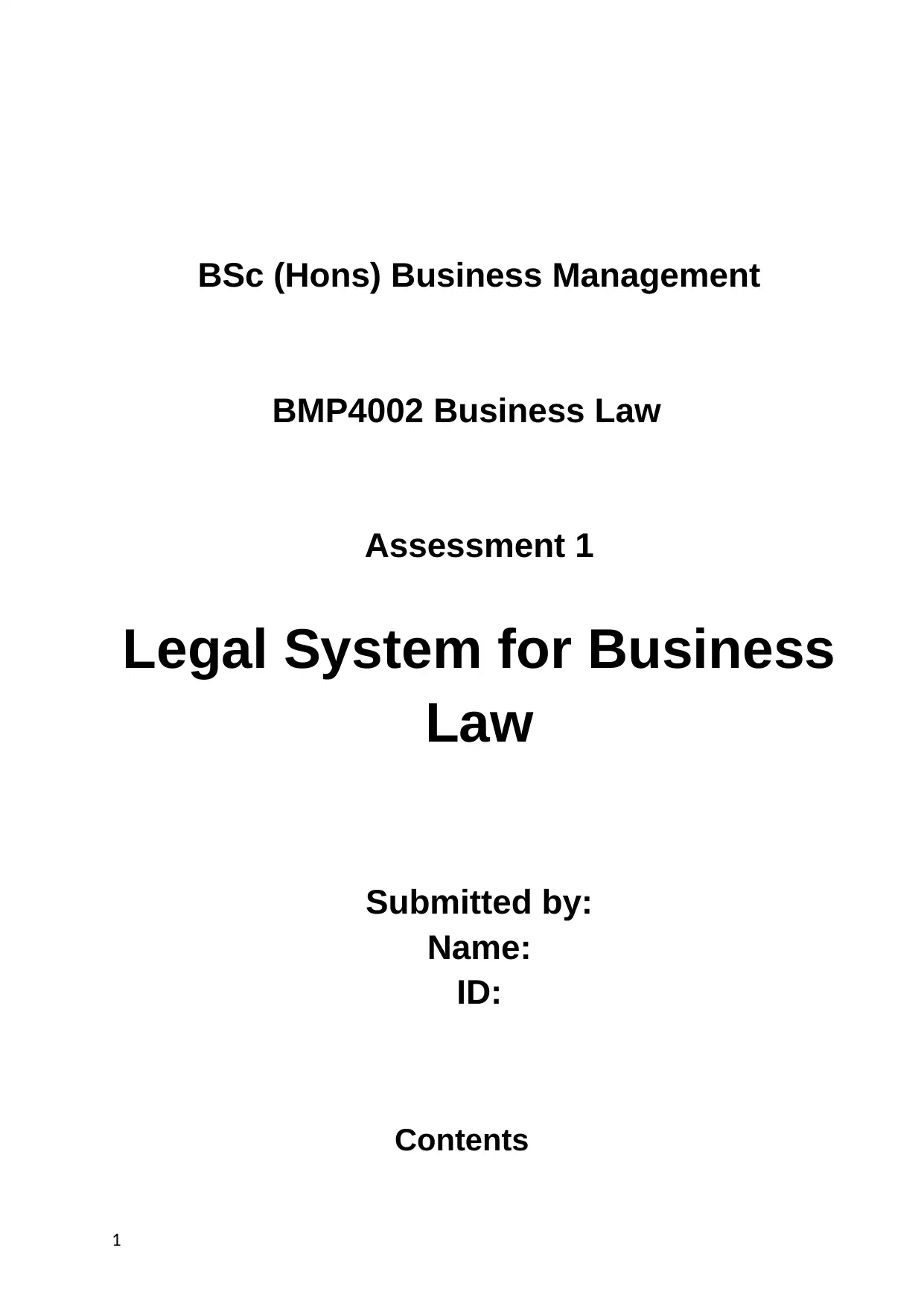
BSc (Hons) Business Management
BMP4002 Business Law
Assessment 1
Legal System for Business
Law
Submitted by:
Name:
ID:
Contents
1
BMP4002 Business Law
Assessment 1
Legal System for Business
Law
Submitted by:
Name:
ID:
Contents
1
Paraphrase This Document
Need a fresh take? Get an instant paraphrase of this document with our AI Paraphraser
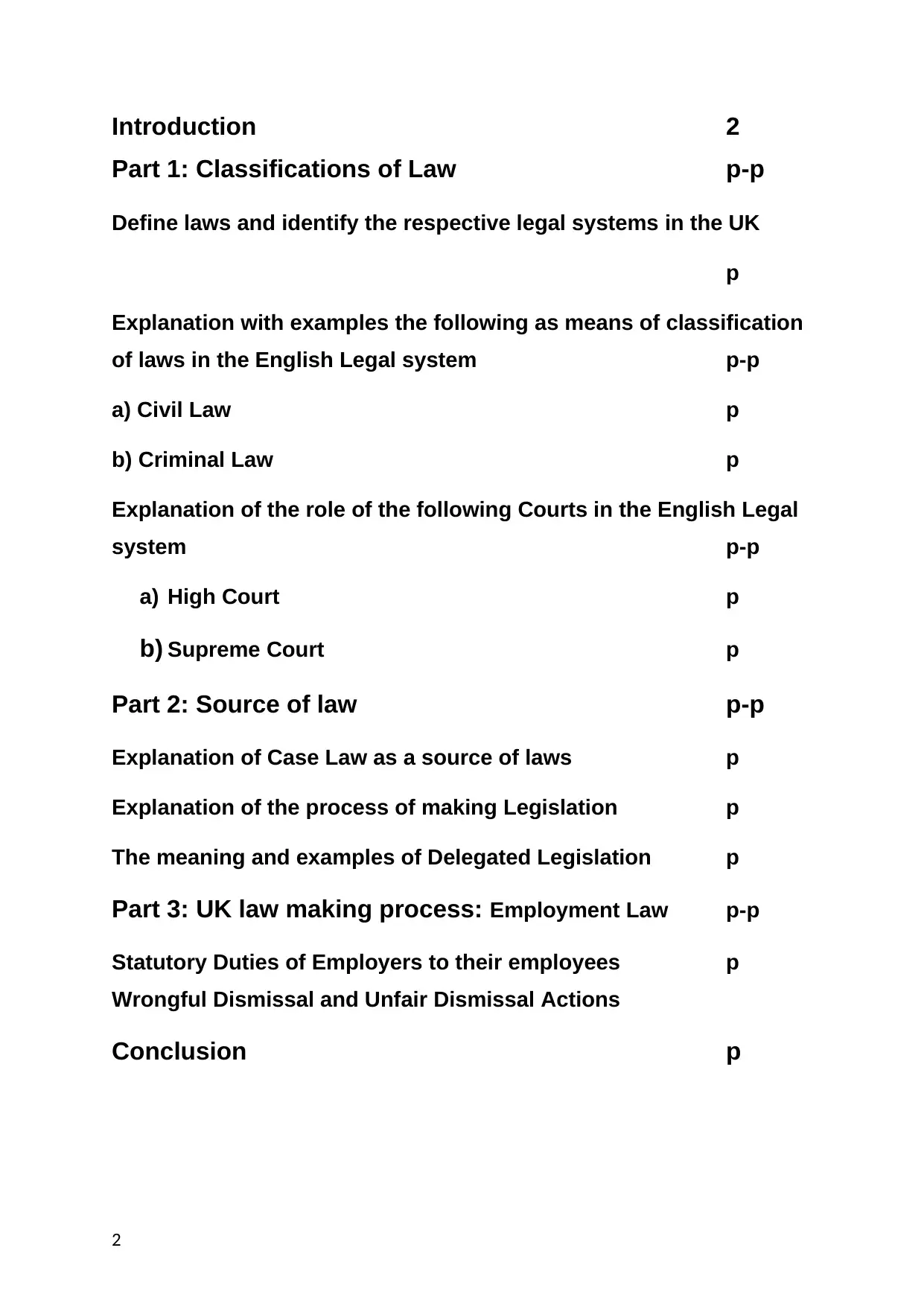
Introduction 2
Part 1: Classifications of Law p-p
Define laws and identify the respective legal systems in the UK
p
Explanation with examples the following as means of classification
of laws in the English Legal system p-p
a) Civil Law p
b) Criminal Law p
Explanation of the role of the following Courts in the English Legal
system p-p
a) High Court p
b) Supreme Court p
Part 2: Source of law p-p
Explanation of Case Law as a source of laws p
Explanation of the process of making Legislation p
The meaning and examples of Delegated Legislation p
Part 3: UK law making process: Employment Law p-p
Statutory Duties of Employers to their employees p
Wrongful Dismissal and Unfair Dismissal Actions
Conclusion p
2
Part 1: Classifications of Law p-p
Define laws and identify the respective legal systems in the UK
p
Explanation with examples the following as means of classification
of laws in the English Legal system p-p
a) Civil Law p
b) Criminal Law p
Explanation of the role of the following Courts in the English Legal
system p-p
a) High Court p
b) Supreme Court p
Part 2: Source of law p-p
Explanation of Case Law as a source of laws p
Explanation of the process of making Legislation p
The meaning and examples of Delegated Legislation p
Part 3: UK law making process: Employment Law p-p
Statutory Duties of Employers to their employees p
Wrongful Dismissal and Unfair Dismissal Actions
Conclusion p
2
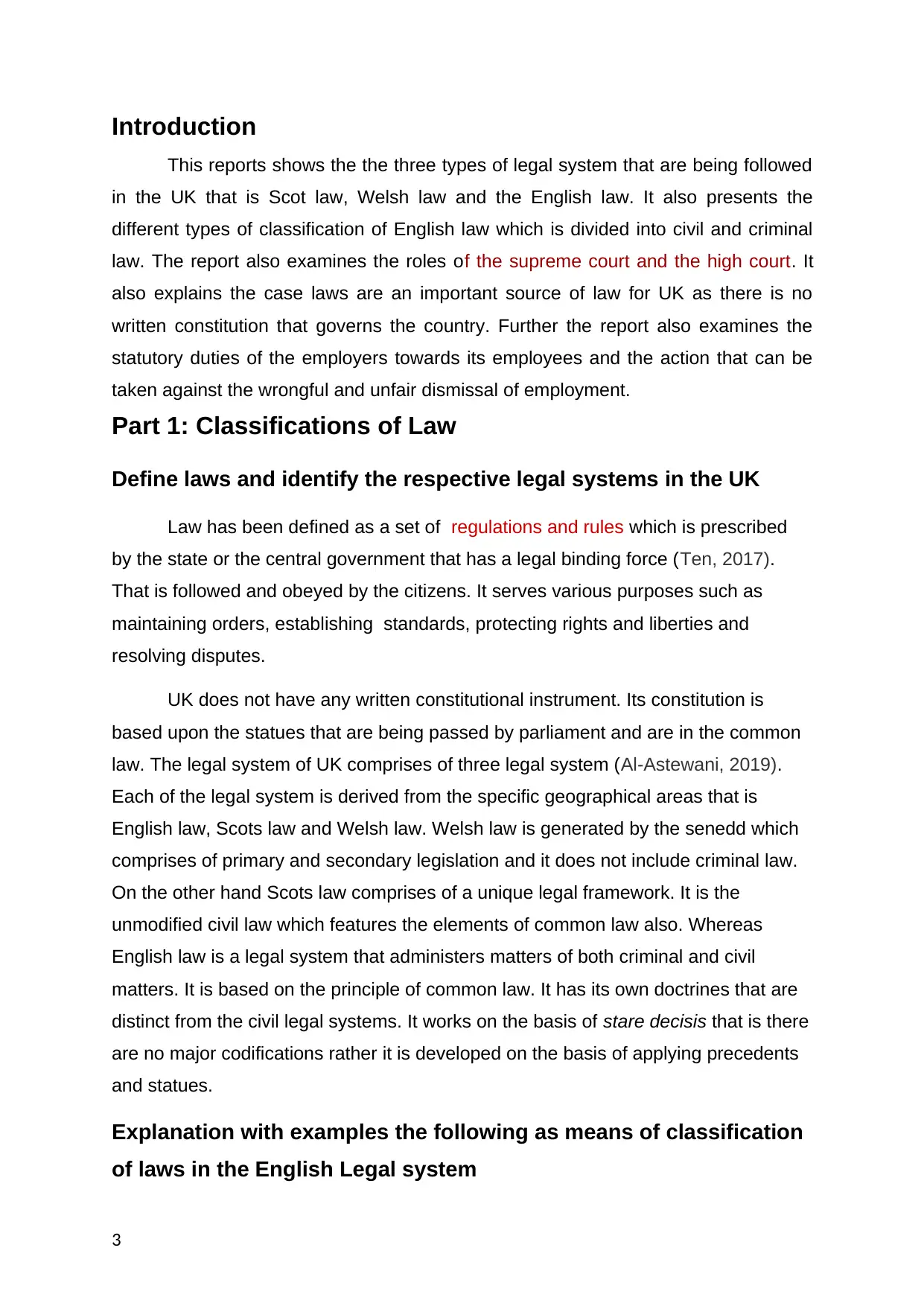
Introduction
This reports shows the the three types of legal system that are being followed
in the UK that is Scot law, Welsh law and the English law. It also presents the
different types of classification of English law which is divided into civil and criminal
law. The report also examines the roles of the supreme court and the high court. It
also explains the case laws are an important source of law for UK as there is no
written constitution that governs the country. Further the report also examines the
statutory duties of the employers towards its employees and the action that can be
taken against the wrongful and unfair dismissal of employment.
Part 1: Classifications of Law
Define laws and identify the respective legal systems in the UK
Law has been defined as a set of regulations and rules which is prescribed
by the state or the central government that has a legal binding force (Ten, 2017).
That is followed and obeyed by the citizens. It serves various purposes such as
maintaining orders, establishing standards, protecting rights and liberties and
resolving disputes.
UK does not have any written constitutional instrument. Its constitution is
based upon the statues that are being passed by parliament and are in the common
law. The legal system of UK comprises of three legal system (Al-Astewani, 2019).
Each of the legal system is derived from the specific geographical areas that is
English law, Scots law and Welsh law. Welsh law is generated by the senedd which
comprises of primary and secondary legislation and it does not include criminal law.
On the other hand Scots law comprises of a unique legal framework. It is the
unmodified civil law which features the elements of common law also. Whereas
English law is a legal system that administers matters of both criminal and civil
matters. It is based on the principle of common law. It has its own doctrines that are
distinct from the civil legal systems. It works on the basis of stare decisis that is there
are no major codifications rather it is developed on the basis of applying precedents
and statues.
Explanation with examples the following as means of classification
of laws in the English Legal system
3
This reports shows the the three types of legal system that are being followed
in the UK that is Scot law, Welsh law and the English law. It also presents the
different types of classification of English law which is divided into civil and criminal
law. The report also examines the roles of the supreme court and the high court. It
also explains the case laws are an important source of law for UK as there is no
written constitution that governs the country. Further the report also examines the
statutory duties of the employers towards its employees and the action that can be
taken against the wrongful and unfair dismissal of employment.
Part 1: Classifications of Law
Define laws and identify the respective legal systems in the UK
Law has been defined as a set of regulations and rules which is prescribed
by the state or the central government that has a legal binding force (Ten, 2017).
That is followed and obeyed by the citizens. It serves various purposes such as
maintaining orders, establishing standards, protecting rights and liberties and
resolving disputes.
UK does not have any written constitutional instrument. Its constitution is
based upon the statues that are being passed by parliament and are in the common
law. The legal system of UK comprises of three legal system (Al-Astewani, 2019).
Each of the legal system is derived from the specific geographical areas that is
English law, Scots law and Welsh law. Welsh law is generated by the senedd which
comprises of primary and secondary legislation and it does not include criminal law.
On the other hand Scots law comprises of a unique legal framework. It is the
unmodified civil law which features the elements of common law also. Whereas
English law is a legal system that administers matters of both criminal and civil
matters. It is based on the principle of common law. It has its own doctrines that are
distinct from the civil legal systems. It works on the basis of stare decisis that is there
are no major codifications rather it is developed on the basis of applying precedents
and statues.
Explanation with examples the following as means of classification
of laws in the English Legal system
3
⊘ This is a preview!⊘
Do you want full access?
Subscribe today to unlock all pages.

Trusted by 1+ million students worldwide
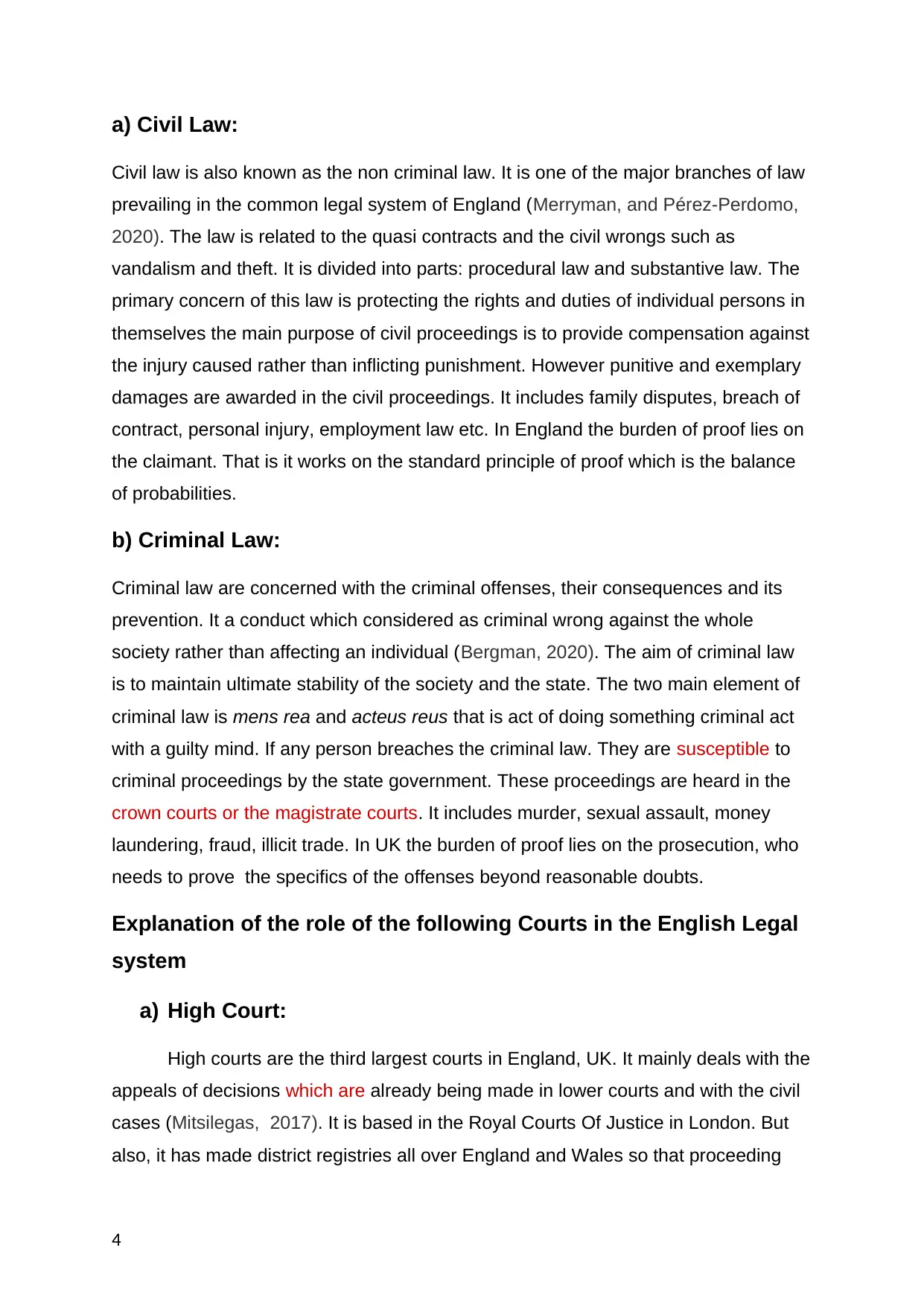
a) Civil Law:
Civil law is also known as the non criminal law. It is one of the major branches of law
prevailing in the common legal system of England (Merryman, and Pérez-Perdomo,
2020). The law is related to the quasi contracts and the civil wrongs such as
vandalism and theft. It is divided into parts: procedural law and substantive law. The
primary concern of this law is protecting the rights and duties of individual persons in
themselves the main purpose of civil proceedings is to provide compensation against
the injury caused rather than inflicting punishment. However punitive and exemplary
damages are awarded in the civil proceedings. It includes family disputes, breach of
contract, personal injury, employment law etc. In England the burden of proof lies on
the claimant. That is it works on the standard principle of proof which is the balance
of probabilities.
b) Criminal Law:
Criminal law are concerned with the criminal offenses, their consequences and its
prevention. It a conduct which considered as criminal wrong against the whole
society rather than affecting an individual (Bergman, 2020). The aim of criminal law
is to maintain ultimate stability of the society and the state. The two main element of
criminal law is mens rea and acteus reus that is act of doing something criminal act
with a guilty mind. If any person breaches the criminal law. They are susceptible to
criminal proceedings by the state government. These proceedings are heard in the
crown courts or the magistrate courts. It includes murder, sexual assault, money
laundering, fraud, illicit trade. In UK the burden of proof lies on the prosecution, who
needs to prove the specifics of the offenses beyond reasonable doubts.
Explanation of the role of the following Courts in the English Legal
system
a) High Court:
High courts are the third largest courts in England, UK. It mainly deals with the
appeals of decisions which are already being made in lower courts and with the civil
cases (Mitsilegas, 2017). It is based in the Royal Courts Of Justice in London. But
also, it has made district registries all over England and Wales so that proceeding
4
Civil law is also known as the non criminal law. It is one of the major branches of law
prevailing in the common legal system of England (Merryman, and Pérez-Perdomo,
2020). The law is related to the quasi contracts and the civil wrongs such as
vandalism and theft. It is divided into parts: procedural law and substantive law. The
primary concern of this law is protecting the rights and duties of individual persons in
themselves the main purpose of civil proceedings is to provide compensation against
the injury caused rather than inflicting punishment. However punitive and exemplary
damages are awarded in the civil proceedings. It includes family disputes, breach of
contract, personal injury, employment law etc. In England the burden of proof lies on
the claimant. That is it works on the standard principle of proof which is the balance
of probabilities.
b) Criminal Law:
Criminal law are concerned with the criminal offenses, their consequences and its
prevention. It a conduct which considered as criminal wrong against the whole
society rather than affecting an individual (Bergman, 2020). The aim of criminal law
is to maintain ultimate stability of the society and the state. The two main element of
criminal law is mens rea and acteus reus that is act of doing something criminal act
with a guilty mind. If any person breaches the criminal law. They are susceptible to
criminal proceedings by the state government. These proceedings are heard in the
crown courts or the magistrate courts. It includes murder, sexual assault, money
laundering, fraud, illicit trade. In UK the burden of proof lies on the prosecution, who
needs to prove the specifics of the offenses beyond reasonable doubts.
Explanation of the role of the following Courts in the English Legal
system
a) High Court:
High courts are the third largest courts in England, UK. It mainly deals with the
appeals of decisions which are already being made in lower courts and with the civil
cases (Mitsilegas, 2017). It is based in the Royal Courts Of Justice in London. But
also, it has made district registries all over England and Wales so that proceeding
4
Paraphrase This Document
Need a fresh take? Get an instant paraphrase of this document with our AI Paraphraser
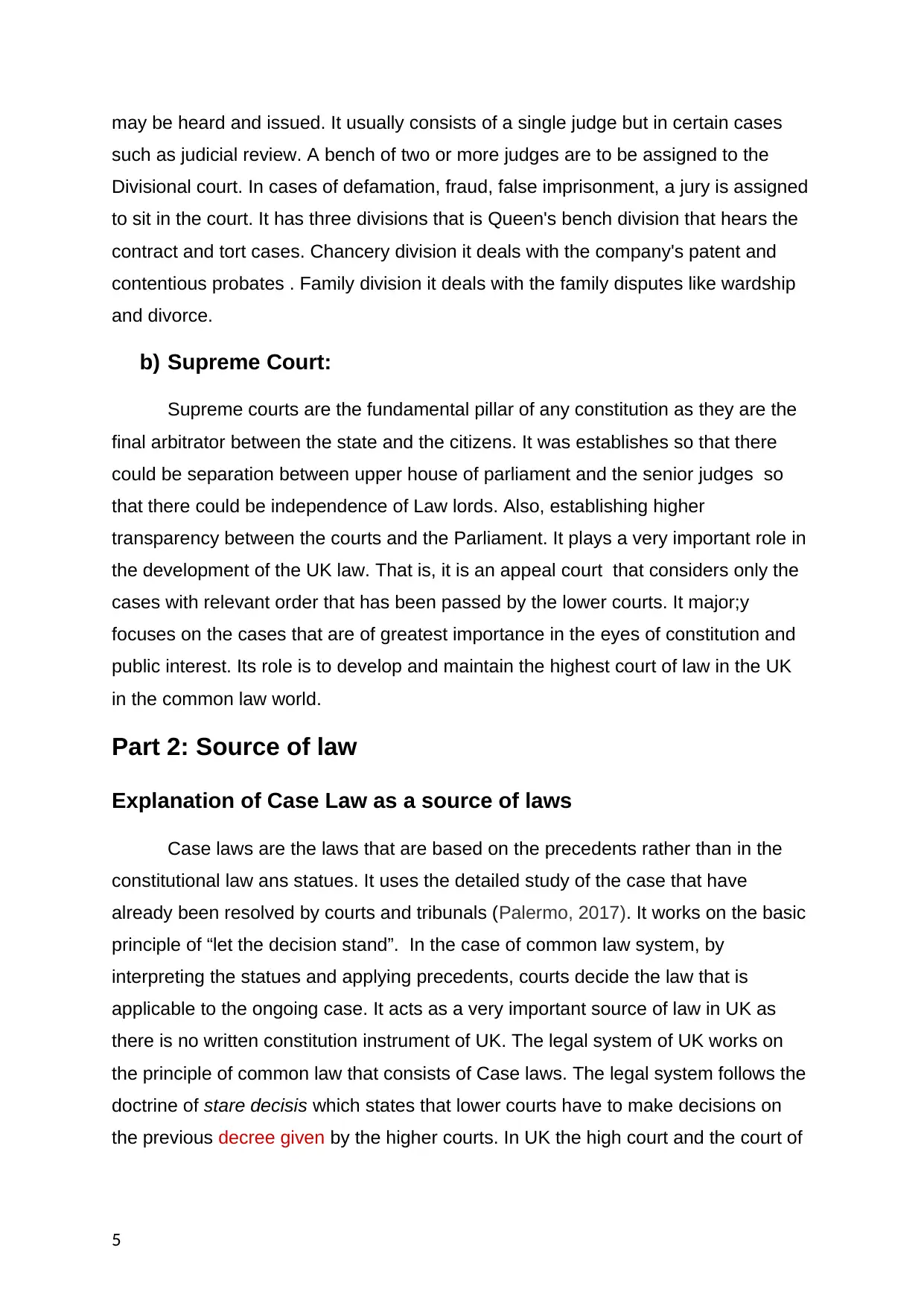
may be heard and issued. It usually consists of a single judge but in certain cases
such as judicial review. A bench of two or more judges are to be assigned to the
Divisional court. In cases of defamation, fraud, false imprisonment, a jury is assigned
to sit in the court. It has three divisions that is Queen's bench division that hears the
contract and tort cases. Chancery division it deals with the company's patent and
contentious probates . Family division it deals with the family disputes like wardship
and divorce.
b) Supreme Court:
Supreme courts are the fundamental pillar of any constitution as they are the
final arbitrator between the state and the citizens. It was establishes so that there
could be separation between upper house of parliament and the senior judges so
that there could be independence of Law lords. Also, establishing higher
transparency between the courts and the Parliament. It plays a very important role in
the development of the UK law. That is, it is an appeal court that considers only the
cases with relevant order that has been passed by the lower courts. It major;y
focuses on the cases that are of greatest importance in the eyes of constitution and
public interest. Its role is to develop and maintain the highest court of law in the UK
in the common law world.
Part 2: Source of law
Explanation of Case Law as a source of laws
Case laws are the laws that are based on the precedents rather than in the
constitutional law ans statues. It uses the detailed study of the case that have
already been resolved by courts and tribunals (Palermo, 2017). It works on the basic
principle of “let the decision stand”. In the case of common law system, by
interpreting the statues and applying precedents, courts decide the law that is
applicable to the ongoing case. It acts as a very important source of law in UK as
there is no written constitution instrument of UK. The legal system of UK works on
the principle of common law that consists of Case laws. The legal system follows the
doctrine of stare decisis which states that lower courts have to make decisions on
the previous decree given by the higher courts. In UK the high court and the court of
5
such as judicial review. A bench of two or more judges are to be assigned to the
Divisional court. In cases of defamation, fraud, false imprisonment, a jury is assigned
to sit in the court. It has three divisions that is Queen's bench division that hears the
contract and tort cases. Chancery division it deals with the company's patent and
contentious probates . Family division it deals with the family disputes like wardship
and divorce.
b) Supreme Court:
Supreme courts are the fundamental pillar of any constitution as they are the
final arbitrator between the state and the citizens. It was establishes so that there
could be separation between upper house of parliament and the senior judges so
that there could be independence of Law lords. Also, establishing higher
transparency between the courts and the Parliament. It plays a very important role in
the development of the UK law. That is, it is an appeal court that considers only the
cases with relevant order that has been passed by the lower courts. It major;y
focuses on the cases that are of greatest importance in the eyes of constitution and
public interest. Its role is to develop and maintain the highest court of law in the UK
in the common law world.
Part 2: Source of law
Explanation of Case Law as a source of laws
Case laws are the laws that are based on the precedents rather than in the
constitutional law ans statues. It uses the detailed study of the case that have
already been resolved by courts and tribunals (Palermo, 2017). It works on the basic
principle of “let the decision stand”. In the case of common law system, by
interpreting the statues and applying precedents, courts decide the law that is
applicable to the ongoing case. It acts as a very important source of law in UK as
there is no written constitution instrument of UK. The legal system of UK works on
the principle of common law that consists of Case laws. The legal system follows the
doctrine of stare decisis which states that lower courts have to make decisions on
the previous decree given by the higher courts. In UK the high court and the court of
5
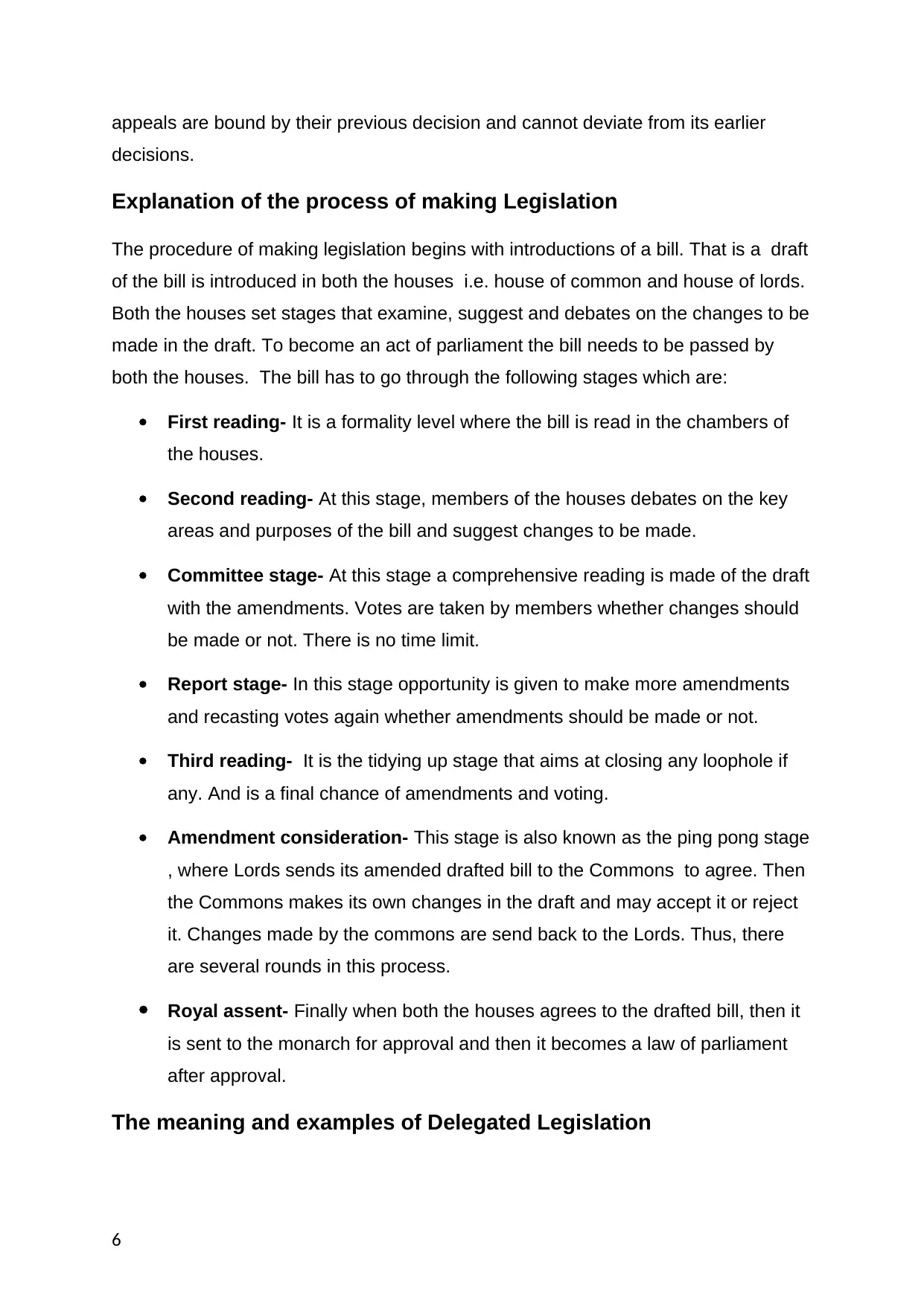
appeals are bound by their previous decision and cannot deviate from its earlier
decisions.
Explanation of the process of making Legislation
The procedure of making legislation begins with introductions of a bill. That is a draft
of the bill is introduced in both the houses i.e. house of common and house of lords.
Both the houses set stages that examine, suggest and debates on the changes to be
made in the draft. To become an act of parliament the bill needs to be passed by
both the houses. The bill has to go through the following stages which are:
First reading- It is a formality level where the bill is read in the chambers of
the houses.
Second reading- At this stage, members of the houses debates on the key
areas and purposes of the bill and suggest changes to be made.
Committee stage- At this stage a comprehensive reading is made of the draft
with the amendments. Votes are taken by members whether changes should
be made or not. There is no time limit.
Report stage- In this stage opportunity is given to make more amendments
and recasting votes again whether amendments should be made or not.
Third reading- It is the tidying up stage that aims at closing any loophole if
any. And is a final chance of amendments and voting.
Amendment consideration- This stage is also known as the ping pong stage
, where Lords sends its amended drafted bill to the Commons to agree. Then
the Commons makes its own changes in the draft and may accept it or reject
it. Changes made by the commons are send back to the Lords. Thus, there
are several rounds in this process.
Royal assent- Finally when both the houses agrees to the drafted bill, then it
is sent to the monarch for approval and then it becomes a law of parliament
after approval.
The meaning and examples of Delegated Legislation
6
decisions.
Explanation of the process of making Legislation
The procedure of making legislation begins with introductions of a bill. That is a draft
of the bill is introduced in both the houses i.e. house of common and house of lords.
Both the houses set stages that examine, suggest and debates on the changes to be
made in the draft. To become an act of parliament the bill needs to be passed by
both the houses. The bill has to go through the following stages which are:
First reading- It is a formality level where the bill is read in the chambers of
the houses.
Second reading- At this stage, members of the houses debates on the key
areas and purposes of the bill and suggest changes to be made.
Committee stage- At this stage a comprehensive reading is made of the draft
with the amendments. Votes are taken by members whether changes should
be made or not. There is no time limit.
Report stage- In this stage opportunity is given to make more amendments
and recasting votes again whether amendments should be made or not.
Third reading- It is the tidying up stage that aims at closing any loophole if
any. And is a final chance of amendments and voting.
Amendment consideration- This stage is also known as the ping pong stage
, where Lords sends its amended drafted bill to the Commons to agree. Then
the Commons makes its own changes in the draft and may accept it or reject
it. Changes made by the commons are send back to the Lords. Thus, there
are several rounds in this process.
Royal assent- Finally when both the houses agrees to the drafted bill, then it
is sent to the monarch for approval and then it becomes a law of parliament
after approval.
The meaning and examples of Delegated Legislation
6
⊘ This is a preview!⊘
Do you want full access?
Subscribe today to unlock all pages.

Trusted by 1+ million students worldwide
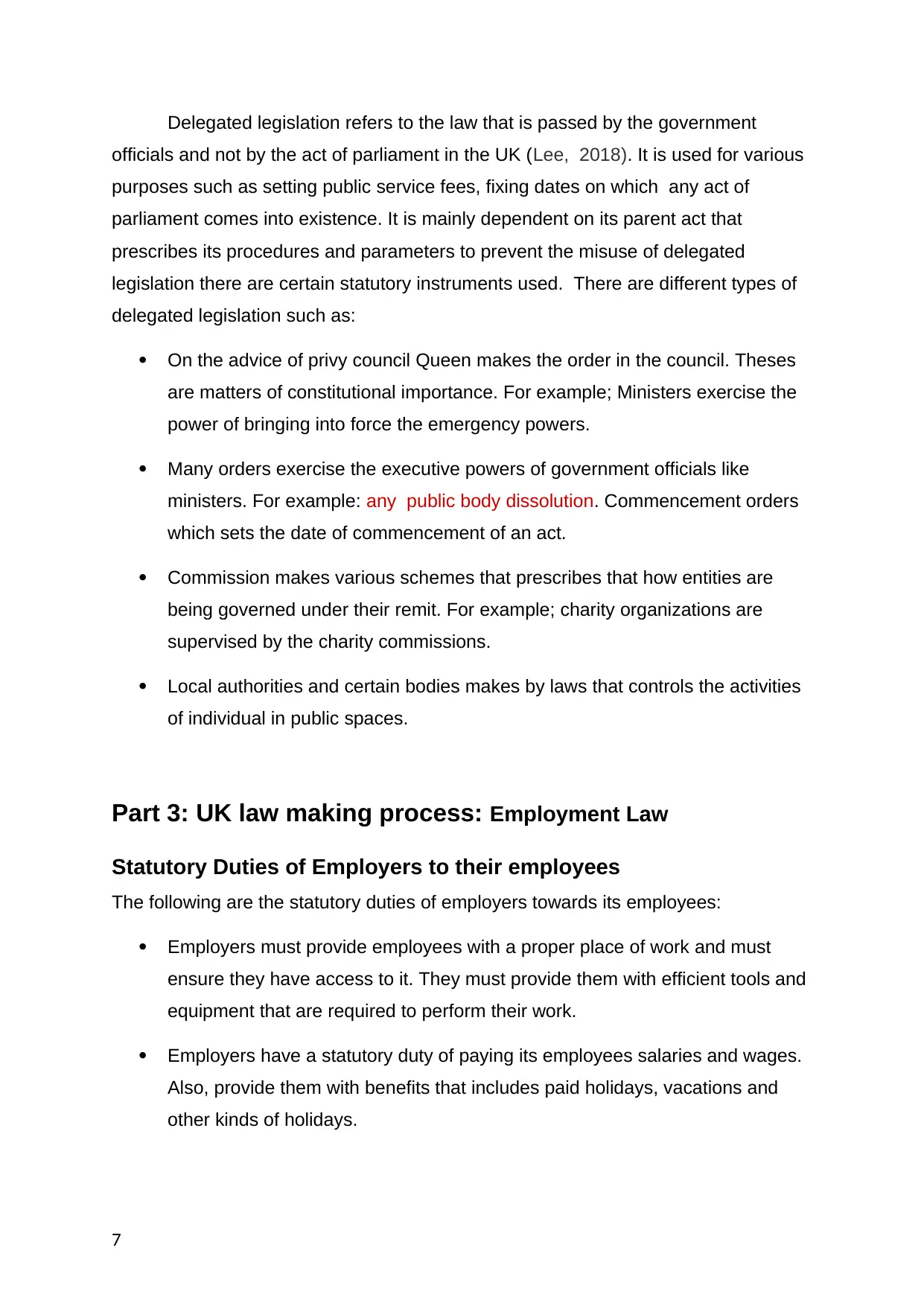
Delegated legislation refers to the law that is passed by the government
officials and not by the act of parliament in the UK (Lee, 2018). It is used for various
purposes such as setting public service fees, fixing dates on which any act of
parliament comes into existence. It is mainly dependent on its parent act that
prescribes its procedures and parameters to prevent the misuse of delegated
legislation there are certain statutory instruments used. There are different types of
delegated legislation such as:
On the advice of privy council Queen makes the order in the council. Theses
are matters of constitutional importance. For example; Ministers exercise the
power of bringing into force the emergency powers.
Many orders exercise the executive powers of government officials like
ministers. For example: any public body dissolution. Commencement orders
which sets the date of commencement of an act.
Commission makes various schemes that prescribes that how entities are
being governed under their remit. For example; charity organizations are
supervised by the charity commissions.
Local authorities and certain bodies makes by laws that controls the activities
of individual in public spaces.
Part 3: UK law making process: Employment Law
Statutory Duties of Employers to their employees
The following are the statutory duties of employers towards its employees:
Employers must provide employees with a proper place of work and must
ensure they have access to it. They must provide them with efficient tools and
equipment that are required to perform their work.
Employers have a statutory duty of paying its employees salaries and wages.
Also, provide them with benefits that includes paid holidays, vacations and
other kinds of holidays.
7
officials and not by the act of parliament in the UK (Lee, 2018). It is used for various
purposes such as setting public service fees, fixing dates on which any act of
parliament comes into existence. It is mainly dependent on its parent act that
prescribes its procedures and parameters to prevent the misuse of delegated
legislation there are certain statutory instruments used. There are different types of
delegated legislation such as:
On the advice of privy council Queen makes the order in the council. Theses
are matters of constitutional importance. For example; Ministers exercise the
power of bringing into force the emergency powers.
Many orders exercise the executive powers of government officials like
ministers. For example: any public body dissolution. Commencement orders
which sets the date of commencement of an act.
Commission makes various schemes that prescribes that how entities are
being governed under their remit. For example; charity organizations are
supervised by the charity commissions.
Local authorities and certain bodies makes by laws that controls the activities
of individual in public spaces.
Part 3: UK law making process: Employment Law
Statutory Duties of Employers to their employees
The following are the statutory duties of employers towards its employees:
Employers must provide employees with a proper place of work and must
ensure they have access to it. They must provide them with efficient tools and
equipment that are required to perform their work.
Employers have a statutory duty of paying its employees salaries and wages.
Also, provide them with benefits that includes paid holidays, vacations and
other kinds of holidays.
7
Paraphrase This Document
Need a fresh take? Get an instant paraphrase of this document with our AI Paraphraser
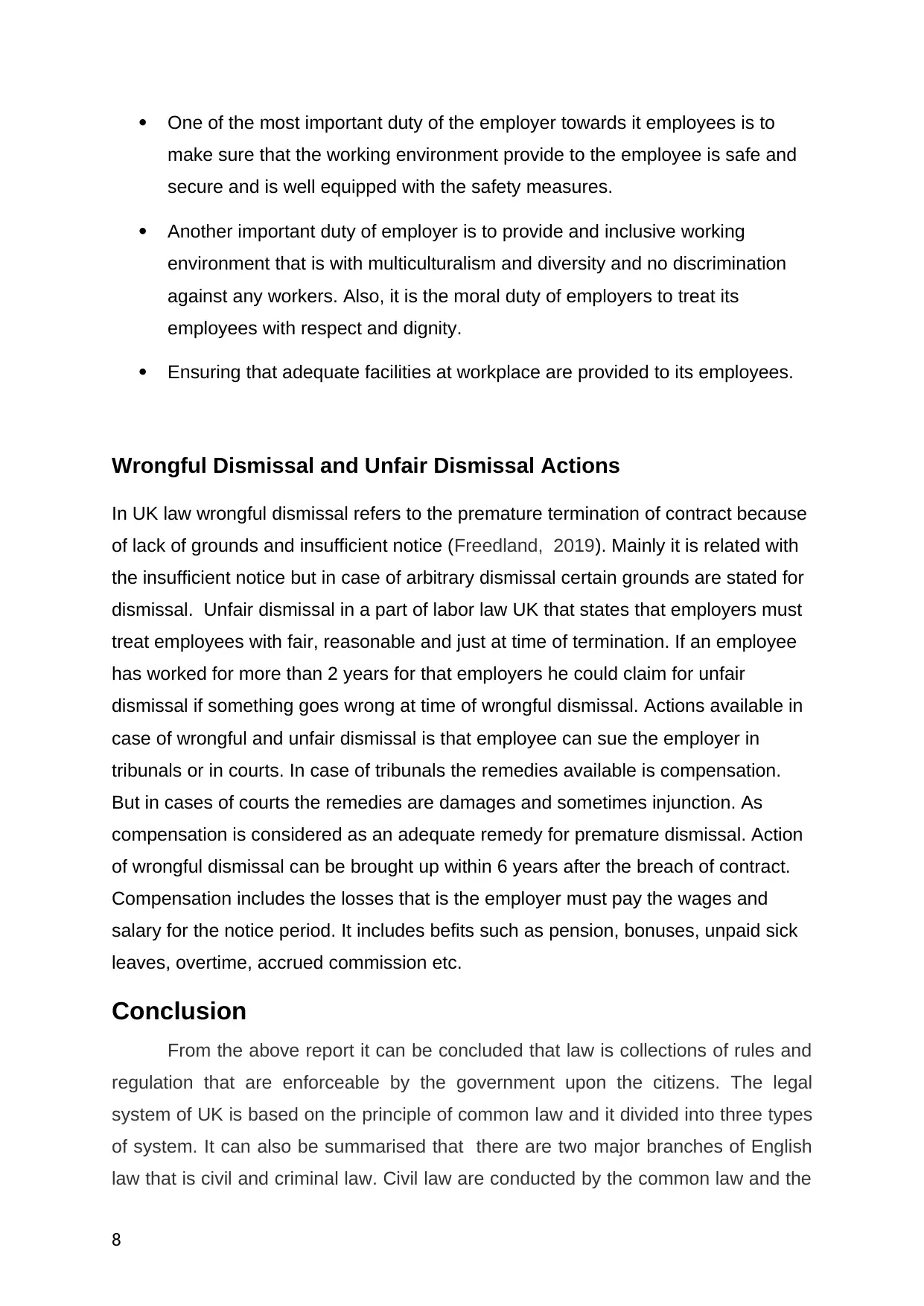
One of the most important duty of the employer towards it employees is to
make sure that the working environment provide to the employee is safe and
secure and is well equipped with the safety measures.
Another important duty of employer is to provide and inclusive working
environment that is with multiculturalism and diversity and no discrimination
against any workers. Also, it is the moral duty of employers to treat its
employees with respect and dignity.
Ensuring that adequate facilities at workplace are provided to its employees.
Wrongful Dismissal and Unfair Dismissal Actions
In UK law wrongful dismissal refers to the premature termination of contract because
of lack of grounds and insufficient notice (Freedland, 2019). Mainly it is related with
the insufficient notice but in case of arbitrary dismissal certain grounds are stated for
dismissal. Unfair dismissal in a part of labor law UK that states that employers must
treat employees with fair, reasonable and just at time of termination. If an employee
has worked for more than 2 years for that employers he could claim for unfair
dismissal if something goes wrong at time of wrongful dismissal. Actions available in
case of wrongful and unfair dismissal is that employee can sue the employer in
tribunals or in courts. In case of tribunals the remedies available is compensation.
But in cases of courts the remedies are damages and sometimes injunction. As
compensation is considered as an adequate remedy for premature dismissal. Action
of wrongful dismissal can be brought up within 6 years after the breach of contract.
Compensation includes the losses that is the employer must pay the wages and
salary for the notice period. It includes befits such as pension, bonuses, unpaid sick
leaves, overtime, accrued commission etc.
Conclusion
From the above report it can be concluded that law is collections of rules and
regulation that are enforceable by the government upon the citizens. The legal
system of UK is based on the principle of common law and it divided into three types
of system. It can also be summarised that there are two major branches of English
law that is civil and criminal law. Civil law are conducted by the common law and the
8
make sure that the working environment provide to the employee is safe and
secure and is well equipped with the safety measures.
Another important duty of employer is to provide and inclusive working
environment that is with multiculturalism and diversity and no discrimination
against any workers. Also, it is the moral duty of employers to treat its
employees with respect and dignity.
Ensuring that adequate facilities at workplace are provided to its employees.
Wrongful Dismissal and Unfair Dismissal Actions
In UK law wrongful dismissal refers to the premature termination of contract because
of lack of grounds and insufficient notice (Freedland, 2019). Mainly it is related with
the insufficient notice but in case of arbitrary dismissal certain grounds are stated for
dismissal. Unfair dismissal in a part of labor law UK that states that employers must
treat employees with fair, reasonable and just at time of termination. If an employee
has worked for more than 2 years for that employers he could claim for unfair
dismissal if something goes wrong at time of wrongful dismissal. Actions available in
case of wrongful and unfair dismissal is that employee can sue the employer in
tribunals or in courts. In case of tribunals the remedies available is compensation.
But in cases of courts the remedies are damages and sometimes injunction. As
compensation is considered as an adequate remedy for premature dismissal. Action
of wrongful dismissal can be brought up within 6 years after the breach of contract.
Compensation includes the losses that is the employer must pay the wages and
salary for the notice period. It includes befits such as pension, bonuses, unpaid sick
leaves, overtime, accrued commission etc.
Conclusion
From the above report it can be concluded that law is collections of rules and
regulation that are enforceable by the government upon the citizens. The legal
system of UK is based on the principle of common law and it divided into three types
of system. It can also be summarised that there are two major branches of English
law that is civil and criminal law. Civil law are conducted by the common law and the
8
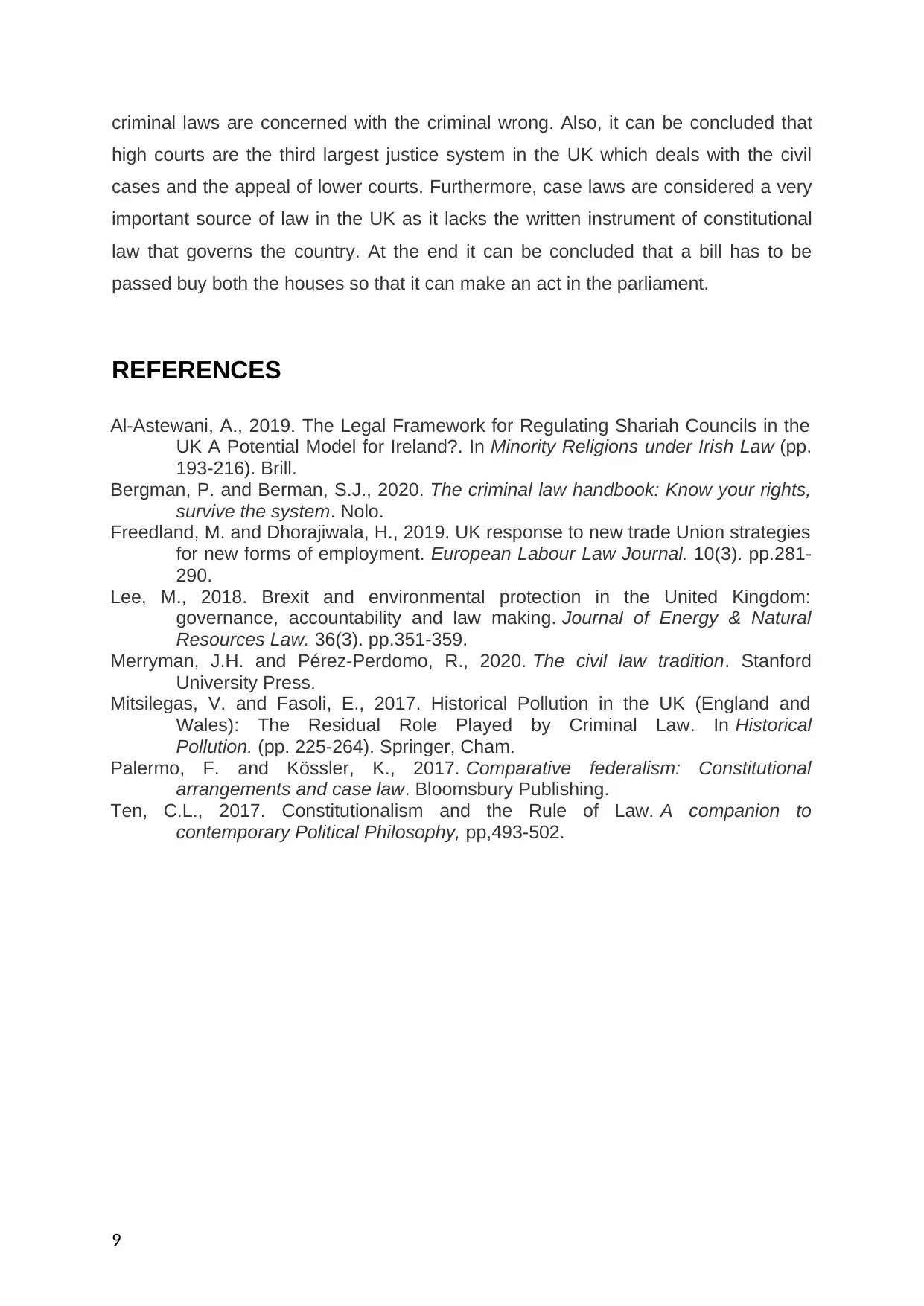
criminal laws are concerned with the criminal wrong. Also, it can be concluded that
high courts are the third largest justice system in the UK which deals with the civil
cases and the appeal of lower courts. Furthermore, case laws are considered a very
important source of law in the UK as it lacks the written instrument of constitutional
law that governs the country. At the end it can be concluded that a bill has to be
passed buy both the houses so that it can make an act in the parliament.
REFERENCES
Al-Astewani, A., 2019. The Legal Framework for Regulating Shariah Councils in the
UK A Potential Model for Ireland?. In Minority Religions under Irish Law (pp.
193-216). Brill.
Bergman, P. and Berman, S.J., 2020. The criminal law handbook: Know your rights,
survive the system. Nolo.
Freedland, M. and Dhorajiwala, H., 2019. UK response to new trade Union strategies
for new forms of employment. European Labour Law Journal. 10(3). pp.281-
290.
Lee, M., 2018. Brexit and environmental protection in the United Kingdom:
governance, accountability and law making. Journal of Energy & Natural
Resources Law. 36(3). pp.351-359.
Merryman, J.H. and Pérez-Perdomo, R., 2020. The civil law tradition. Stanford
University Press.
Mitsilegas, V. and Fasoli, E., 2017. Historical Pollution in the UK (England and
Wales): The Residual Role Played by Criminal Law. In Historical
Pollution. (pp. 225-264). Springer, Cham.
Palermo, F. and Kössler, K., 2017. Comparative federalism: Constitutional
arrangements and case law. Bloomsbury Publishing.
Ten, C.L., 2017. Constitutionalism and the Rule of Law. A companion to
contemporary Political Philosophy, pp,493-502.
9
high courts are the third largest justice system in the UK which deals with the civil
cases and the appeal of lower courts. Furthermore, case laws are considered a very
important source of law in the UK as it lacks the written instrument of constitutional
law that governs the country. At the end it can be concluded that a bill has to be
passed buy both the houses so that it can make an act in the parliament.
REFERENCES
Al-Astewani, A., 2019. The Legal Framework for Regulating Shariah Councils in the
UK A Potential Model for Ireland?. In Minority Religions under Irish Law (pp.
193-216). Brill.
Bergman, P. and Berman, S.J., 2020. The criminal law handbook: Know your rights,
survive the system. Nolo.
Freedland, M. and Dhorajiwala, H., 2019. UK response to new trade Union strategies
for new forms of employment. European Labour Law Journal. 10(3). pp.281-
290.
Lee, M., 2018. Brexit and environmental protection in the United Kingdom:
governance, accountability and law making. Journal of Energy & Natural
Resources Law. 36(3). pp.351-359.
Merryman, J.H. and Pérez-Perdomo, R., 2020. The civil law tradition. Stanford
University Press.
Mitsilegas, V. and Fasoli, E., 2017. Historical Pollution in the UK (England and
Wales): The Residual Role Played by Criminal Law. In Historical
Pollution. (pp. 225-264). Springer, Cham.
Palermo, F. and Kössler, K., 2017. Comparative federalism: Constitutional
arrangements and case law. Bloomsbury Publishing.
Ten, C.L., 2017. Constitutionalism and the Rule of Law. A companion to
contemporary Political Philosophy, pp,493-502.
9
⊘ This is a preview!⊘
Do you want full access?
Subscribe today to unlock all pages.

Trusted by 1+ million students worldwide
1 out of 9
Related Documents
Your All-in-One AI-Powered Toolkit for Academic Success.
+13062052269
info@desklib.com
Available 24*7 on WhatsApp / Email
![[object Object]](/_next/static/media/star-bottom.7253800d.svg)
Unlock your academic potential
Copyright © 2020–2026 A2Z Services. All Rights Reserved. Developed and managed by ZUCOL.


